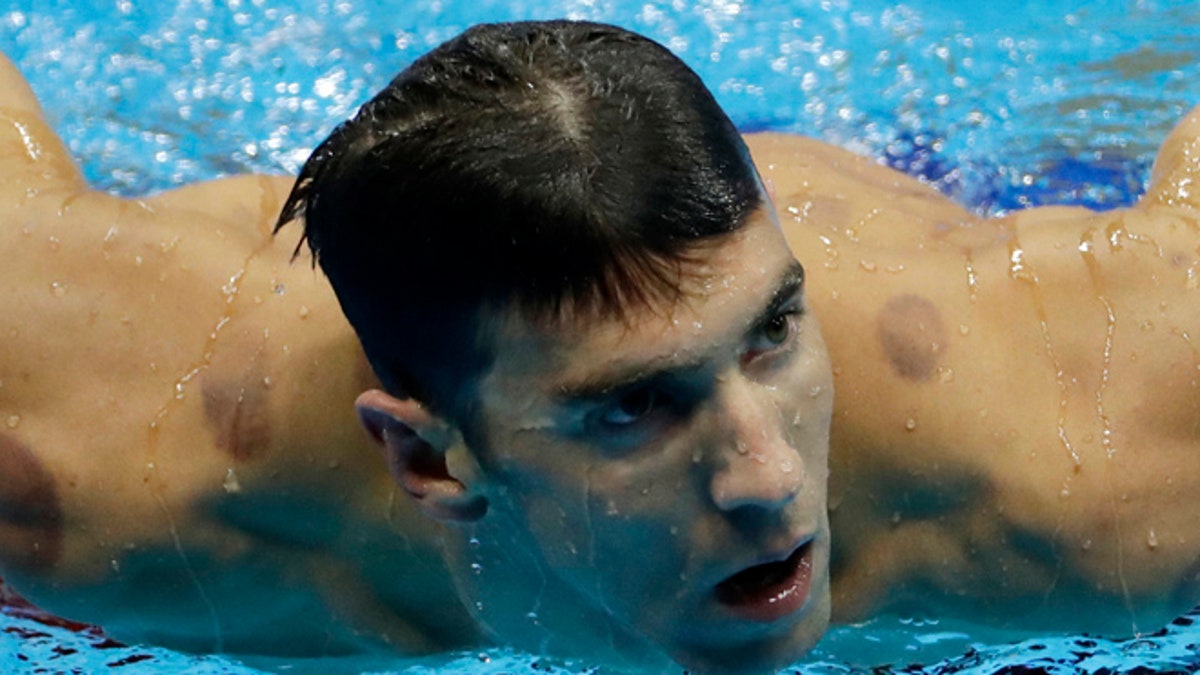
United States' Michael Phelps leaves the pool after winning a heat of the men's 200-meter individual medley during the swimming competitions at the 2016 Summer Olympics, Wednesday, Aug. 10, 2016, in Rio de Janeiro, Brazil. (AP Photo/Matt Slocum) (AP Photo/Matt Slocum)
Michael Phelps didn't have much time to savor his double gold-medal night.
He was back at the Olympic Aquatics Stadium on Wednesday, getting started on his bid to win the 200-meter individual medley for the fourth straight time.
After five hours of sleep, Phelps said he actually felt rather fresh for the afternoon preliminaries. He cruised through his heat with the third-fastest time overall, 1 minute, 58.41 seconds, which trailed only American teammate Ryan Lochte (1:57.38) and Germany's Philip Heintz (1:57.59).
"It really wasn't that bad," said Phelps, who won both the 200 butterfly and 4x200 freestyle relay late Tuesday night. "I've been able to put my body through things like this over the years. Hopefully I can keep it rolling one more time."
The 31-year-old Phelps moved on to the evening semifinals, carrying on his bid to become a four-time champion in an event he first won at the 2004 Athens Olympics. The 200 IM is one of two races that Phelps can win for the fourth straight time, along with the still-to-come 100 butterfly.
Phelps said he's been texting with former Baltimore Ravens star Ray Lewis, talking about the right way to end his career. Lewis closed out with a Super Bowl victory.
"Leaving everything in the pool one last time is what I'm going to do," Phelps said. "If that's good enough to win, we'll see."
The Americans also led preliminaries of the women's 4x200 freestyle relay with a group that, in a bit of a surprise, included Missy Franklin.
Even though she finished second at the U.S. Olympic trials, which normally would've meant giving her the afternoon off along with expected anchor Katie Ledecky, Franklin's poor form prompted the coaches to rest Leah Smith instead.
"Anytime I can be on a relay — whether it's morning, night, in practice, whatever it is — it means the absolute world to me," said Franklin, who didn't even qualify for the final of the 200 freestyle and has only one individual event left after the relay. "We got out there and did our job. We needed to get them a good lane tonight. We know our coaches are going to make the decision putting our best foot forward."
With Ledecky and Smith assured on being on the team for the final, that left two available spots. Allison Schmitt, competing in what is likely the final event of her career, clearly earned one of them with a blistering split time of 1:55.95.
Franklin (1:57.03) and Melanie Margalis (1:57.04) were essentially even, though Franklin's experience and resume as a five-time medalist at the 2012 London Games would seemingly give her an edge for the fourth position. Cierra Runge was the slowest of the group, 1:57.75.
"I want what's best for this team," Franklin said. "If that's not including me, then that's what I want. If that's including me, then that's what I want. I want what's best for us and best for our country, no matter what."
In other events Wednesday afternoon, world-record holder Cate Campbell of Australia was top qualifier in the 100 freestyle with an Olympic-record time of 52.78. Simone Manuel of the United States took the second spot, followed by Sarah Sjostrom of Sweden and defending Olympic champion Ranomi Kromowidjojo of the Netherlands.
Another American, Abbey Weitzeil, advanced with the seventh-fastest time. So did Campbell's younger sister, reigning world champion Bronte, in the eighth spot.
Rikke Moller Pedersen of Denmark set the pace in the women's 200 breaststroke, which provides another chance for American Lilly King and Russia's Yulia Efimova to carry on their rivalry. This one doesn't figure to be as dramatic as their showdown in the 100 breast.
King, who beat Efimova for the gold in the shorter race after calling out the Russian's doping history, is not nearly as dominant in the longer race. She barely qualified for the semifinals with the 15th-best time. Efimova was eighth.
Russia's Evgeny Rylov led the way in the 200 backstroke, followed by China's Xu Jiayu, Australia's Mitch Larkin and Americans Ryan Murphy and Jacob Pebley.
Murphy already won gold in the 100 back.
